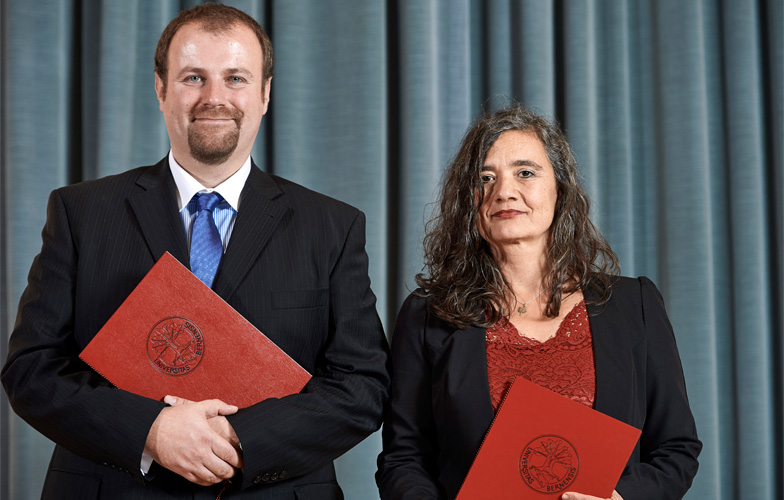2015
Award ceremony at the Dies academicus
On the occasion of the 181st Dies academicus 2015 at the Kultur-Casino in Bern, the two winners of the Bernese Award for Environmental Research 2015/16 were honored for their work.

Main Prize
The Main Prize goes to Dr. Pierrick Buri for his scientific publication “Promoting Pollinating Insects in Intensive Agricultural Matrices: Field-Scale Experimental Manipulation of Hay-Meadow Mowing Regimes and Its Effects on Bees”. Extensively used meadows are among the most biologically diverse habitats in Switzerland and Europe. In recent decades they have come under strong pressure due to the continued intensification of farming practices. Various measures have been introduced in Switzerland and in Europe to counteract the negative effects of the intensification of agriculture – unfortunately, with limited effect on biodiversity. Pierrick Buri investigated how such measures, in particular the extensive farming of meadows, can be made more effective in terms of benefits for wild bees. He tested various mowing regimes and compared their effects on the diversity of wild bees. The greatest benefit for wild bees is provided by meadows which are left partly unmowed in the first round of mowing. Meadows used in this way provide the wild bees with vital resources at a time when these sources are largely lacking elsewhere. The results of Pierrick Buri’s work can be directly incorporated into agricultural policy and provide an important contribution towards optimizing the benefits of environmental measures in agriculture for biodiversity.
Recognition Award
The Recognition Award goes to Bettina Scharrer for her master’s thesis on the problem of manure in Lake Sempach, and the interplay between intensive animal husbandry and water protection in canton Lucerne from 1976 to 2003 (title in German: Dem Sempachersee kommt die Gülle hoch – Das Spannungsfeld zwischen intensiver Tierhaltung und Gewässerschutz im Kanton Luzern 1976-2003.) In her thesis Bettina Scharrer investigates the problem of the “dying lakes” in Lucerne’s central plateau, a phenomenon that has been mainly caused by excessive phosphorus in the water. This eutrophication is the result of intensive livestock production, which has led to the overfertilization of fields. She also investigates possible approaches to countering this eutrophication, taking the examples of Lake Sempach, Lake Baldegg, and Lake Hallwil. Bettina Scharrer provides a differentiated insight into the variety of factors that have led to this environmental problem, and shows which social and agricultural developments, actors, interests, and policies were involved in creating it. The thesis is well-structured and contains a restrained, balanced assessment of an emotionally charged topic, thus contributing to a better understanding of a still current and partially unsolved environmental problem.
Nominations for 2015/16
| Name | Title |
|---|---|
| Dr. Elisabeth Bürgi Bonanomi | Sustainable development in international law making and trade |
| Dr. Pierrick Buri | Promoting pollinating insects in intensive agricultural matrices: Field-scale experimental manipulation of hay-meadow mowing regimes and its effects on bees |
| Dr. Katharina Conradin | World natural heritage and sustainable regional development |
| Dr. Johanna Jacobi | The contribution of organic cocoa production to social-ecological resilience in a changing climate: a comparison of organic and non-organic cocoa cultivation systems in Alto Beni, Bolivia |
| Dr. Daniel Krämer | 'Menschen grasten nun mit dem Vieh' Eine Untersuchung der sozialen Verletzlichkeit der Gesellschaft in der letzten grossen Hungerkrise der Schweiz 1816/17 |
| Bettina Scharrer | ‘Dem Sempachersee kommt die Gülle hoch‘ Das Spannungsfeld zwischen intensiver Tierhaltung und Gewässerschutz im Kanton Luzern 1976- 2003 |
| Dr. Ben Spycher | Background ionizing radiation and the risk of childhood cancer: A census-based nationwide cohort study |
| Peter Stucki | Dynamical downscaling and loss modeling for the reconstruction of historical weather extremes and their impacts - A severe foehn storm in 1925 |
